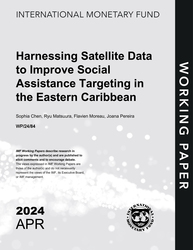
Harnessing Satellite Data to Improve Social Assistance Targeting in the Eastern Caribbean
Harnessing Satellite Data to Improve Social Assistance Targeting in the Eastern Caribbean
READ MORE...
Volume/Issue:
Volume 2024
Issue 084
Publication date: April 2024
ISBN: 9798400274312
$20.00
Add to Cart by clicking price of the language and format you'd like to purchase
Available Languages and Formats
| English |
Prices in red indicate formats that are not yet available but are forthcoming.
Topics covered in this book
This title contains information about the following subjects.
Click on a subject if you would like to see other titles with the same subjects.
Economics- Macroeconomics , Public Finance , Economics / General , Natural Disasters , Demography , Social assistance targeting , satellite data , machine learning , Eastern Caribbean , Small Island Developing States , , aggregation bias , hard-to-verify information , satellite imagery processing , Income , Natural disasters , Caribbean
Summary
Prioritizing populations most in need of social assistance is an important policy decision. In the Eastern Caribbean, social assistance targeting is constrained by limited data and the need for rapid support in times of large economic and natural disaster shocks. We leverage recent advances in machine learning and satellite imagery processing to propose an implementable strategy in the face of these constraints. We show that local well-being can be predicted with high accuracy in the Eastern Caribbean region using satellite data and that such predictions can be used to improve targeting by reducing aggregation bias, better allocating resources across areas, and proxying for information difficult to verify.
Copyright © 2010 - 2026
Powered by:
AIDC



